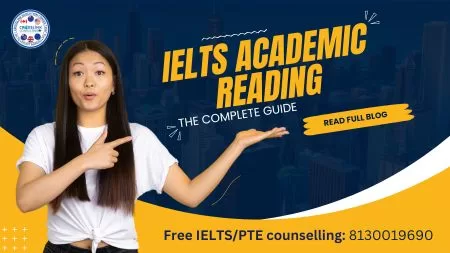The IELTS Academic Reading test might be difficult, but you can enhance your score with the appropriate tactics and practice.Here are some tips and tricks to help you excel in the IELTS Reading section:
Understand the Format:
Familiarize yourself with the different types of reading tasks in the IELTS test, including multiple-choice, matching headings, sentence completion, and more.
Understand the specific requirements of each task.
Skim and Scan:
Before you dive into the details of the passage, quickly skim the text to get a general idea of the topic, structure, and main ideas. Use scanning to locate specific information in the passage, such as keywords related to the questions.
Read the Instructions Carefully:
Pay close attention to the instructions for each task. Different tasks might require you to identify main ideas, match information, complete sentences, or locate specific details. Following instructions accurately is crucial.
Time Management:
The IELTS Reading section has a time limit. Aim to spend about 20 minutes on each passage and its associated questions. If you find a particular question challenging, move on and come back to it later if you have time.
Predict Answers:
Before you look at the options or answer choices, try to predict what the answer might be based on your understanding of the passage. This can help you stay focused and identify the correct answer more easily.
Keyword Identification:
Identify keywords or phrases in both the questions and the passage. These keywords can guide you to the relevant information in the text. Synonyms and paraphrases are common, so be on the lookout for those as well.
Read Carefully:
While scanning is useful for finding specific information, reading carefully is essential to fully understand the context and nuances of the passage. This will help you answer questions that require a deeper comprehension of the text.
Guessing Strategies:
If you’re unsure about an answer, eliminate obviously incorrect options and make an educated guess based on the information you have. There’s no penalty for incorrect answers, so guessing is better than leaving a question blank.
Pay Attention to True/False/Not Given:
These types of questions can be tricky. Remember that “True” means the information matches the passage, “False” means it contradicts the passage, and “Not Given” means the information is not mentioned in the passage.
Practice Regularly:
The more you practice IELTS academic reading different types of passages and answering questions, the more comfortable you’ll become with the format and the types of questions asked.
Vocabulary Enhancement:
Improve your vocabulary by reading a variety of materials in English. This will not only help you understand passages better but also allow you to grasp subtler meanings and nuances.
Time-Saving Techniques:
For tasks that involve matching headings or sentence completion, consider IELTS academic reading the headings or partial sentences first before delving into the passage. This can help you quickly locate relevant information. Remember that consistent practice and exposure to a wide range of reading materials in English will significantly contribute to your success in the IELTS Academic Reading section.



